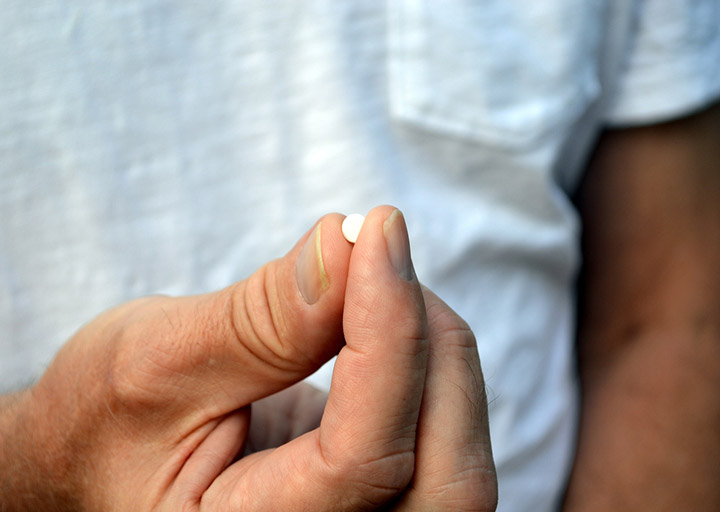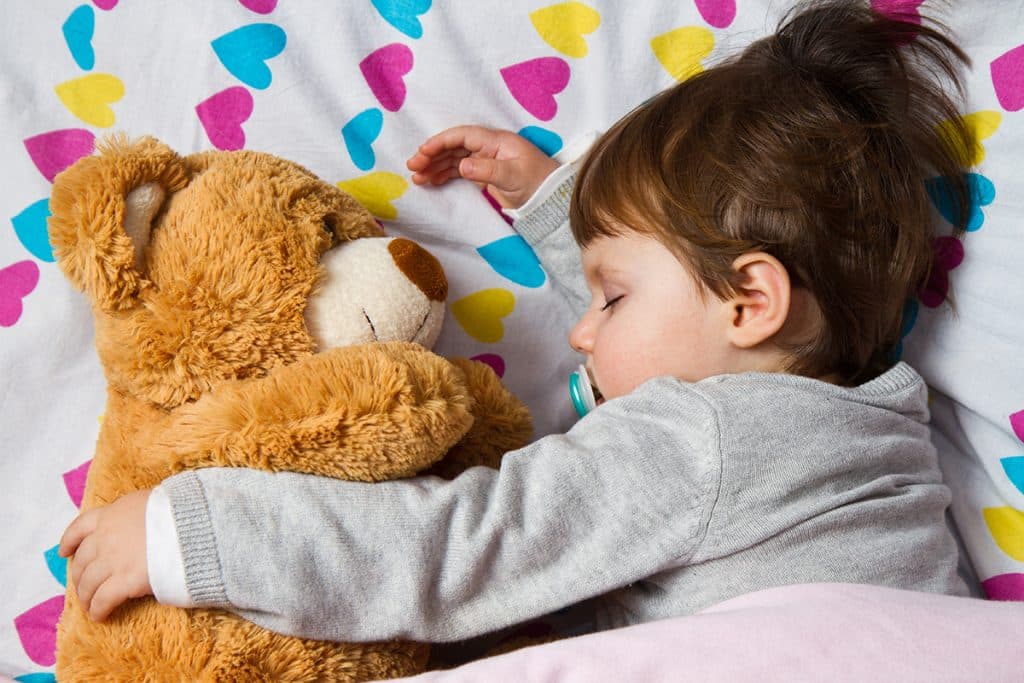Who knew getting your kids on a consistent sleep schedule would be so difficult? From time changes to travel plans, there seem to be sleep disturbances around every corner. If your little one is having a hard time getting to sleep at their usual time, you may find yourself wondering if melatonin can help ease the transition and get everyone back on track.
Not all experts agree on whether or not melatonin is safe for kids. So it’s important to understand how the natural supplement works and to talk to your pediatrician or family medical provider before giving your child any supplement or over-the-counter medications to help them sleep.
What Is Melatonin?

Melatonin is a popular over-the-counter sleep aid. It’s considered a natural supplement because melatonin is produced by your body as part of your sleep-wake cycle, known as the circadian rhythm.
Your pineal gland releases melatonin, a hormone, into your bloodstream around dusk. The hormone acts as a messenger, announcing to your brain and body: “Night is coming! Prepare for sleep!”
As night progresses, the amount of melatonin your pineal gland produces decreases. When dawn hits—and daylight shines on your closed eyelids—your pineal gland hits the brakes and ceases melatonin production completely. The “sleep signals” stop and your body starts the process of waking.
In his book, Why We Sleep, sleep expert and Professor of Neuroscience Matthew Walker, Ph.D., says that melatonin’s role is to influence the timing of sleep, but it does not play a role in generating sleep.
Walker compares the hormone to a timing official at a 100-meter race; it gathers together all of the brain regions and processes responsible for sleep and then sends them all off toward the finish line at the right time.
Takeaway
Melatonin is a hormone released by your pineal gland to prepare your body for sleep. It controls sleep timing as part of your natural sleep-wake cycle, but does not control the parts of the brain or bodily processes related to inducing sleep.
Does Melatonin Work for Kids?
According to Harvard Medical School, melatonin is the second-most-popular supplement given to children, behind multivitamins. But just because a supplement is “natural” or easily available at pharmacies or grocery stores doesn’t mean it’s safe for everyone. Because of the risk of melatonin overdose, the American Academy of Sleep Medicine (AASM) recently issued a health advisory warning about its use.
When Can Kids Have Melatonin?
The AASM states that melatonin can improve sleep in children whose body clocks are “off schedule.” Sleep expert Matthew Walker agrees; he advocates for melatonin as a solution to jet lag and other issues related to sleep timing.
If you have traveled across different time zones or time change has negatively affected your kids, melatonin may help “reset” their internal clocks when taken 2 hours before bedtime.
Who Should Not Have Melatonin?
Melatonin supplements aren’t for everyone. According to Johns Hopkins University, melatonin should not be used if you are pregnant or breastfeeding or have an autoimmune disorder, a seizure disorder, or depression.
In most cases, very young children, such as infants and babies, should not be given melatonin. Unlike adults, infants and young children experience “polyphasic sleep” — multiple short snippets of sleep throughout the day and night. They do not experience the “monophasic sleep” pattern that older children and adults do: sleeping at night and staying awake during the day.
Boston Children’s Hospital warns melatonin should not be given to healthy, typically developing children under age three.
Always consult a medical professional when considering a sleep supplement or over-the-counter sleep medication for your child.
Side Effects of Melatonin in Kids
Like any dietary supplement or “natural” supplement, melatonin can have side effects in kids, especially if they’ve received too large a dose.
Harvard reports overdoses of melatonin can lead to excessive sleepiness, headaches, nausea, or agitation.
Other potential melatonin side effects include:
- Feeling sleepy or tired in the daytime
- Dizziness
- Feeling irritable or restless
- Dry mouth
- Itchy or dry skin
- Pains in your arms or legs
- Strange dreams or night sweats
- Bedwetting
- Mood changes
- Morning grogginess
How Long Does Melatonin Last in a Child?
In adults, melatonin can last up to five hours in the body. That’s why you’ll often see a warning sign on a bottle of melatonin saying not to drive or operate heavy equipment within five hours of consuming it.
But kids metabolize medications, vitamins, and supplements differently than adults do. Children metabolize medications more quickly, so melatonin may not last as long in a child compared to an adult.

Melatonin Dosage for Kids
Melatonin supplements come in many forms and doses, ranging from one mg and up. There is no clear consensus for the “right” dose of melatonin. The American Academy of Pediatrics recommends you start with the lowest dose recommended by your pediatrician.
Is Melatonin Safe for Kids?
Some scientific evidence suggests melatonin is safe when used correctly and can shorten the time to fall asleep in children with insomnia, including children with ADHD, anxiety, and autism.
Melatonin for Kids with ADHD
ADHD (attention-deficit/hyperactivity disorder) is the most common neurodevelopmental disorder, characterized by persistent and impairing patterns of inattention, hyperactivity, and impulsivity. Many of the medications used to treat ADHD can disrupt sleep patterns. A 2019 study on the effects of melatonin on children with ADHD suggested melatonin could be a safe and effective solution for sleep problems caused by ADHD treatment medications.
Melatonin for Kids with Anxiety
Teens and children who suffer from depression and anxiety may also have issues with sleep disturbances. An interesting meta-analysis suggests that treating sleep issues with melatonin was linked to lower levels of self-harm—especially in adolescent girls with depression and anxiety.
Melatonin for Kids with Autism and Other Spectrum Diagnosis
As many as 80% of children with autism experience poor sleep, which can increase the severity of autism spectrum disorder (ASD). A 2018 study suggests that melatonin has the potential to act on a wide variety of symptoms associated with ASD, having a positive effect on not only sleep but other ASD symptoms such as anxiety, pain/sensory processing, and gastrointestinal dysfunction.
How to Detect Melatonin Poisoning in Kids
Overdosing on melatonin can cause many problems. Melatonin is responsible for 59,300 calls to the Poison Control hotline. Symptoms of a melatonin overdose include excessive sleepiness, vomiting, and trouble breathing. It’s essential to consult a doctor before beginning a melatonin regimen for yourself or your child.
Safe Alternatives to Melatonin for Children
Ensure your child isn’t deficient in magnesium or Vitamin D, as they play an essential role in sleep function and many other bodily functions.
The American Academy of Pediatrics (AAP) recommends that toddlers, older children, and adolescents need 600 IU of vitamin D daily, 110 mg of magnesium (children four to eight years of age), or 350 mg of magnesium (for children older than eight years) daily.

How to Help Your Children Sleep Better
How can you help your child sleep better without the aid of melatonin? There are a number of ways to support a healthy sleep-wake cycle, including:
- Avoid sugar and chocolate in the evenings
- Eat an early dinner and avoid snacking right before bedtime
- Get into a consistent bedtime routine that will work for school nights and weekends
- Give your child a warm bath or shower two hours before bedtime
- Avoid screentime and blue lights from devices (TVs, phones, tablets) for two hours leading up to bedtime
- Avoid caffeine in any form at any time for kids under age 11 and avoid caffeine in the afternoon and evenings for older kids and teens
- Create a sleep-friendly environment that is dark, quiet, cool, and comfortable.
FAQs
Can kids take melatonin every night?
Harvard Medical School warns parents not to give melatonin to their children every night. While not many studies have been done on long-term use, one 2019 study suggested long-term melatonin use in children could delay puberty.
Can kids get addicted to melatonin?
Melatonin is not “addictive” like prescription sleep aids can be. However, consistent use can make it less effective. If your child uses it every night, they may need increasingly higher doses to achieve the same effect, which could put them in danger of a melatonin overdose.
Why is melatonin not working on my child?
If melatonin isn’t working on your child, it could be because you’re expecting it to work in a different way than it’s intended. Remember that melatonin is a natural hormone that regulates sleep timing; it’s most effective when used to reset your natural sleep-wake clock that’s been disturbed by issues such as jet lag, time change, or a disturbance in a sleep schedule.

